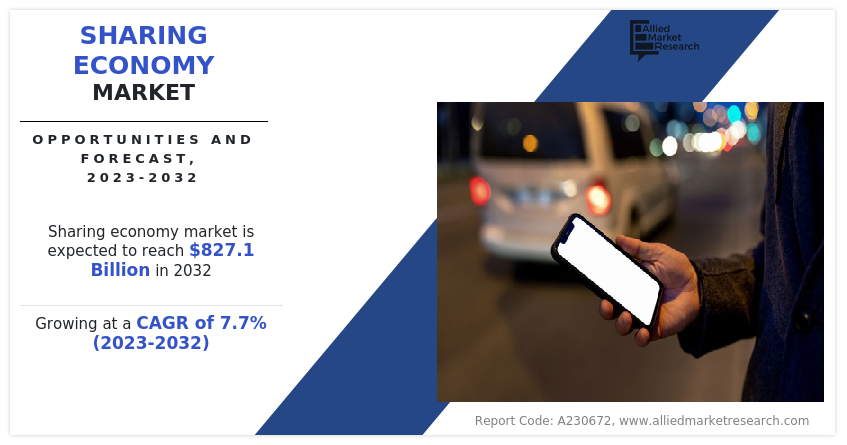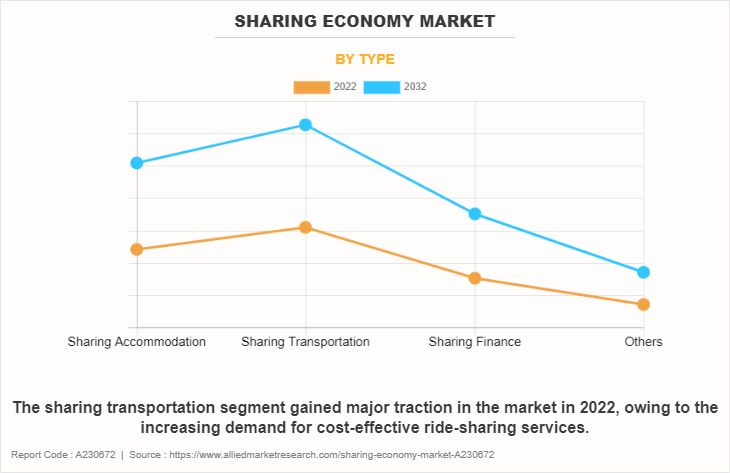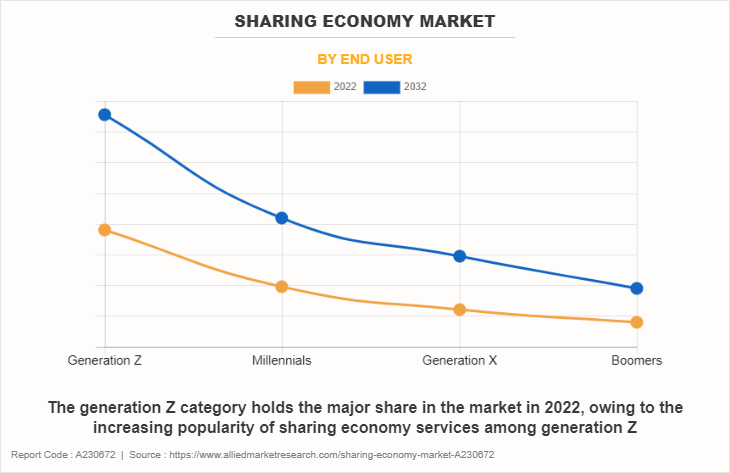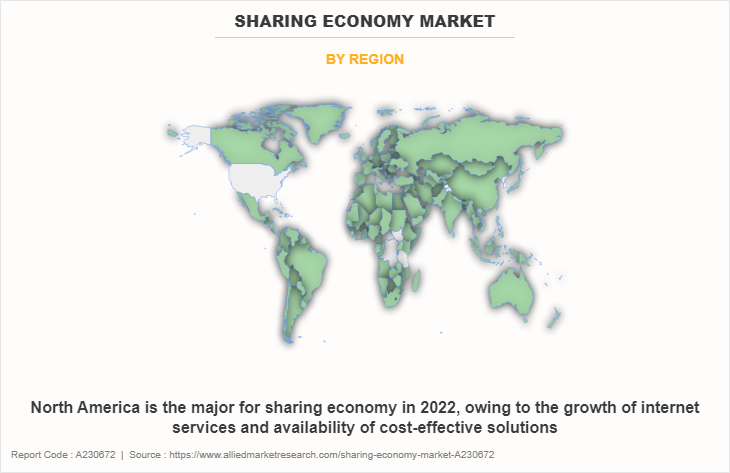Sharing Economy Market Research, 2032
The global sharing economy market size was valued at $387.1 billion in 2022, and is projected to reach $827.1 billion by 2032, growing at a CAGR of 7.7% from 2023 to 2032.

The sharing economy, often referred to as the economy of collaboration or peer economy, is a type of capitalism, in which people or companies provide access to goods, services, or assets to other people via online markets or digital platforms. In place of buying things altogether, it enables peer-to-peer transactions by utilizing technology to make renting, sharing, and exchanging products and services possible. Ride-sharing services such as Uber and Lyft, home-sharing services such as Airbnb, peer-to-peer financing channels, co-working facilities, and even freelancing platforms where people give their talents and services to others are typical instances of sharing economy platforms. The sharing economy fosters a feeling of community and social trust among members while also promoting efficiency of resources, environmental responsibility, and cost savings.
The COVID-19 pandemic had a moderate impact on the sharing economy market, changing the face of this once-thriving industry in a variety of ways. Several factors, such as travel constraints, health issues, and shifting consumer behavior, contribute to this disruption.
Market Overview
The travel and tourism industry was one of the most instantly evident effects. As a result of lockdowns and safety concerns, demand for ride-sharing and short-term lodging services such as Uber, Lyft, and Airbnb significantly decreased. As commuter habits changed and more individuals started working from home, rideshare utilization fell sharply in several cities. Bookings fell dramatically, and Airbnb, which once benefited from visitors looking for distinctive lodging, suffered a serious setback. Travel restrictions and health regulations hindered travel, which resulted in cancellations and income losses for hosts. Airbnb tried to adjust by introducing new characteristics including long-term renting alternatives and online experiences.
Sharing economy platforms provide an attractive alternative to conventional ownership models at a time when consumers are looking for value and affordability on a regular basis. These services allow consumers to obtain what they desire without the financial burden of ownership by supporting the effective sharing of assets such as automobiles, houses, equipment, and labor. Utilization of personal resources, not only eases the financial burden on customers but also coincides with more general sustainability aims. Budget-conscious people and companies alike have responded favorably to the sharing economy's cost-saving advantages, promoting its broad acceptance and market development. In addition, these platforms' cost-effective appeal continues to be a key factor in their continued expansion and the disruption of traditional businesses as they diversify and provide an ever-growing range of services.
The variety of services offered by sharing economy platforms is driving the growth of the sharing economy market. These platforms offer a wide range of services to meet the varied requirements and tastes of their users, going beyond their original product offerings. Introduction and development of sharing economy platforms has given users additional ways to interact with each other. The sharing economy today offers a one-stop shop for numerous facets of contemporary living, whether it is ride-sharing, lodging, delivery of food, pet care, or freelancing employment. This multidimensional strategy has drawn a larger user base, improving consumer loyalty and retention. Along with encouraging people and small enterprises to join the sharing economy ecosystem, it has also spurred entrepreneurial innovation. Sharing economy platforms are anticipated to stay at the forefront of economic growth, pushing conventional business models in a variety of industries as they diversify and respond to changing consumer needs.
The commercial expansion of the sharing economy is being significantly constrained by rise in concerns about consumer data privacy. The increasing awareness of consumers about disclosing their private information on online communities in a world where security breaches and privacy violations are increasing year by year. To comply with the safety standards of the personalized services offered , sharing economy enterprises frequently rely extensively on gathering and using user data, which raises valid concerns about the security of information and the possibility of exploitation. Since the public and governing authorities are paying more attention to privacy problems, there are now tougher data protection laws and consumer expectations for more open data practices. Platforms for the sharing economy are therefore faced with the difficulty of establishing and sustaining trust with its users while guaranteeing adherence to changing privacy rules. It is essential for sharing economy enterprises to prioritize strong data security measures and open data handling practices since, if not appropriately addressed, these worries for data privacy discourage potential customers and impede the market's potential for growth.
Technology adoption and the development of services into foreign markets offer significant prospects for sharing economy market growth. The user interface and operational effectiveness of sharing economy platforms have been greatly improved by technological advancements including smartphone applications, real-time tracking, secure payment methods, and artificial intelligence. These developments facilitate greater adoption by making it simpler for users to connect and use sharing services. In addition, the sharing economy's intrinsic digital nature enables smooth global expansion. As these platforms expand internationally, businesses may access new markets and meet the demands of consumers from various cultural backgrounds. The sharing economy's limitless potential expands its user base while maximizing the global reach in the current digital era. This globalization, when combined with technical advancement, shows a strong development trajectory, indicating the potential for an even more pervasive and varied sharing economy environment in future decades.
Ride-sharing services such as Uber and Lyft have transformed urban transportation by providing quick, affordable, and on-demand trips, eliminating the need for individual automobile ownership. In addition to ride-sharing services, the market is seeing the emergence of electric bikes and scooters for local transport as well as the ongoing advancement of autonomous cars. In addition, the post-pandemic emphasis on cleanliness and safety has given rise to technologies such as contactless payment systems and improved vehicle cleaning requirements. The first- and last-mile solutions provided by partnerships with public transportation systems, as well as environmentally friendly programs such as carpooling and electric vehicle fleets, present the sharing economy market opportunity for growth. With plenty of space for innovation and market growth as consumer tastes continue to change, sharing transport is expected to stay at the forefront of the changing mobility scene.
Segmental Overview
The sharing economy industry is segmented into type, end user, and region. By type, the market is classified into sharing accommodation, sharing transportation, sharing finance, and others. By end user, the market is classified into generation Z, millennials, generation X, and boomers. Region-wise, the market is analyzed across North America (the U.S., Canada, and Mexico), Europe (Germany, UK, France, Spain, Italy, and the rest of Europe), Asia-Pacific (China, Japan, India, Australia, South Korea, and the rest of Asia-Pacific), and LAMEA (Brazil, Saudi Arabia, South Africa, UAE, Argentina, and rest of LAMEA).
By Type
According to the sharing economy market demand, on the basis of type, the sharing transportation segment dominated the market in 2022 and is expected to sustain its market share during the forecast period. Ride-sharing services such as Uber and Lyft have transformed urban transportation by providing quick, affordable, and on-demand trips, eliminating the need for individual automobile ownership, therefore, the global individuals are increasing preferring the sharing transportation services.

By End User
According to the sharing economy market statistics, on the basis of end user the generation Z segment dominated the sharing economy market in 2022 and is expected to sustain its market share during the sharing economy market forecast period. Generation Z opt for unique and immersive peer-to-peer rental services over classic lodging and transportation, preferring services that offer sustainability and cost-effectiveness. They have played an important role in the emergence of the sharing economy, by adopting sites such as Airbnb and Uber for lodging and transportation.

By Region
Region-wise, North America dominated the sharing economy market in 2022 and is expected to be dominant during the forecast period. With the increasing population, westernization, and high interest in trying unique products and services, U.S. has witnessed to be the largest market for sharing economy in North America as well as in the global scenario. As more individuals seek distinctive and enjoyable travel experiences, there is a rise in interest in adopting peer-to-peer services, which is driving the market expansion in the North American region.

Competition Analysis
Players operating in the global sharing economy market have adopted various developmental strategies to expand their sharing economy market share, increase profitability, and remain competitive in the market. Key players profiled in this report include Uber Technologies, Inc., Booking Holdings Inc., Airbnb, Inc., Accor S.A., eBay Inc., Lyft, Inc., Fiverr International Ltd., HubbleHQ, Avis Budget Group, Inc., and Stashbee Limited.
Examples of Acquisition in the Global Sharing Economy Market
- In November 2021, Uber Freight, a subsidiary of Uber Technologies, Inc., completed acquisition of Transplace from TPG Capital to create leading logistics technology platforms to meet the rapidly evolving needs of shippers.
- Uber Technologies, Inc. acquired a company Drizly, a leading on-demand alcohol marketplace in North America to integrate their complementary delivery apps and services.
Examples of Partnership in the Global Sharing Economy Market
- In May 2023, Uber Technologies, Inc. and Waymo announced a partnership to make the Waymo driver available to more customers through the Uber platform.
- In April 2021, Uber Technologies, Inc., announced delivery partnership for Uber Eats with Little Caesars, the third largest pizza chain in the world to provide service in all 50 states of the U.S.
Key Benefits For Stakeholders
- This report provides a quantitative analysis of the market segments, current trends, estimations, and dynamics of the sharing economy market analysis from 2022 to 2032 to identify the prevailing sharing economy market opportunities.
- The market research is offered along with information related to key drivers, restraints, and opportunities.
- Porter's five forces analysis highlights the potency of buyers and suppliers to enable stakeholders make profit-oriented business decisions and strengthen their supplier-buyer network.
- In-depth analysis of the sharing economy market segmentation assists to determine the prevailing market opportunities.
- Major countries in each region are mapped according to their revenue contribution to the global market.
- Market player positioning facilitates benchmarking and provides a clear understanding of the present position of the market players.
- The report includes the analysis of the regional as well as global sharing economy market trends, key players, market segments, application areas, and market growth strategies.
Sharing Economy Market Report Highlights
| Aspects | Details |
| Market Size By 2032 | USD 827.1 billion |
| Growth Rate | CAGR of 7.7% |
| Forecast period | 2022 - 2032 |
| Report Pages | 286 |
| By Type |
|
| By End User |
|
| By Region |
|
| Key Market Players | Lyft, Inc., Airbnb, Inc., Uber Technologies, Inc., Accor SA, Avis Budget Group, Inc., Stashbee Limited, Fiverr International Ltd., eBay Inc., HubbleHQ, Booking Holdings, Inc. |
Analyst Review
According to CXOs, the market for the sharing economy has experienced notable expansion and change in recent years. Individuals and companies share resources, services, or assets as the basis of this innovative economic model, which is frequently made possible through digital platforms and mobile apps. The growing desire for accessibility, sustainability, and convenience is one of the main elements fostering its rise. The sharing economy is transforming the traditional economic sectors, such as ride-sharing services businesses such as Uber and Lyft and platforms for short-term rental properties such as Airbnb. Leasing of personal items, peer-to-peer lending, and collaborative work environments are among the industries where the sector has a greater impact.
The ability of this market to employ underutilized resources, unlocking value for both providers and users, is credited with its success. It has also allowed micro-entrepreneurs and gig workers to make money by using their assets, such as automobiles or extra space, to run their businesses. The sharing economy has not, however, been without its difficulties, such as regulatory concerns, labor rights issues, and discussions over liability and safety. The sharing economy is expected to have an impact on many businesses and change consumer behavior as it continues to develop. Future economic growth will probably be impacted by technological innovations, altering consumer preferences, and ongoing regulatory changes. The sharing economy is expected to continue to be a significant and revolutionary force in the global market landscape despite these difficulties and uncertainties.
The sharing economy market size was valued at $387,074.5 million in 2022 and is projected to reach $827,098.1 million by 2032, growing at a CAGR of 7.7% from 2023 to 2032.
The global sharing economy market registered a CAGR of 7.7% from 2023 to 2032.
Raise the query and paste the link of the specific report and our sales executive will revert with the sample.
The forecast period in the sharing economy market report is from 2023 to 2032.
The top companies that hold the market share in the sharing economy market include Uber Technologies, Inc., Booking Holdings Inc., Airbnb, Inc., Accor S.A., eBay Inc., Lyft, Inc and others.
The sharing economy market report has 2 segments. The segments are type and end user.
The emerging countries in the sharing economy market are likely to grow at a CAGR of more than 9% from 2023 to 2032.
Post-COVID-19, the citric market is witnessing new heights of growth and is expected to recover its losses in the next 1-2 years. In the post-COVID era the environment had changed, travel-related platforms are offering new schemes to attract the consumers. Some companies changed their business plans to adjust to the post-pandemic environment by broadening their product lines and entering new markets.
North America will dominate the sharing economy market by the end of 2032.
Loading Table Of Content...
Loading Research Methodology...



